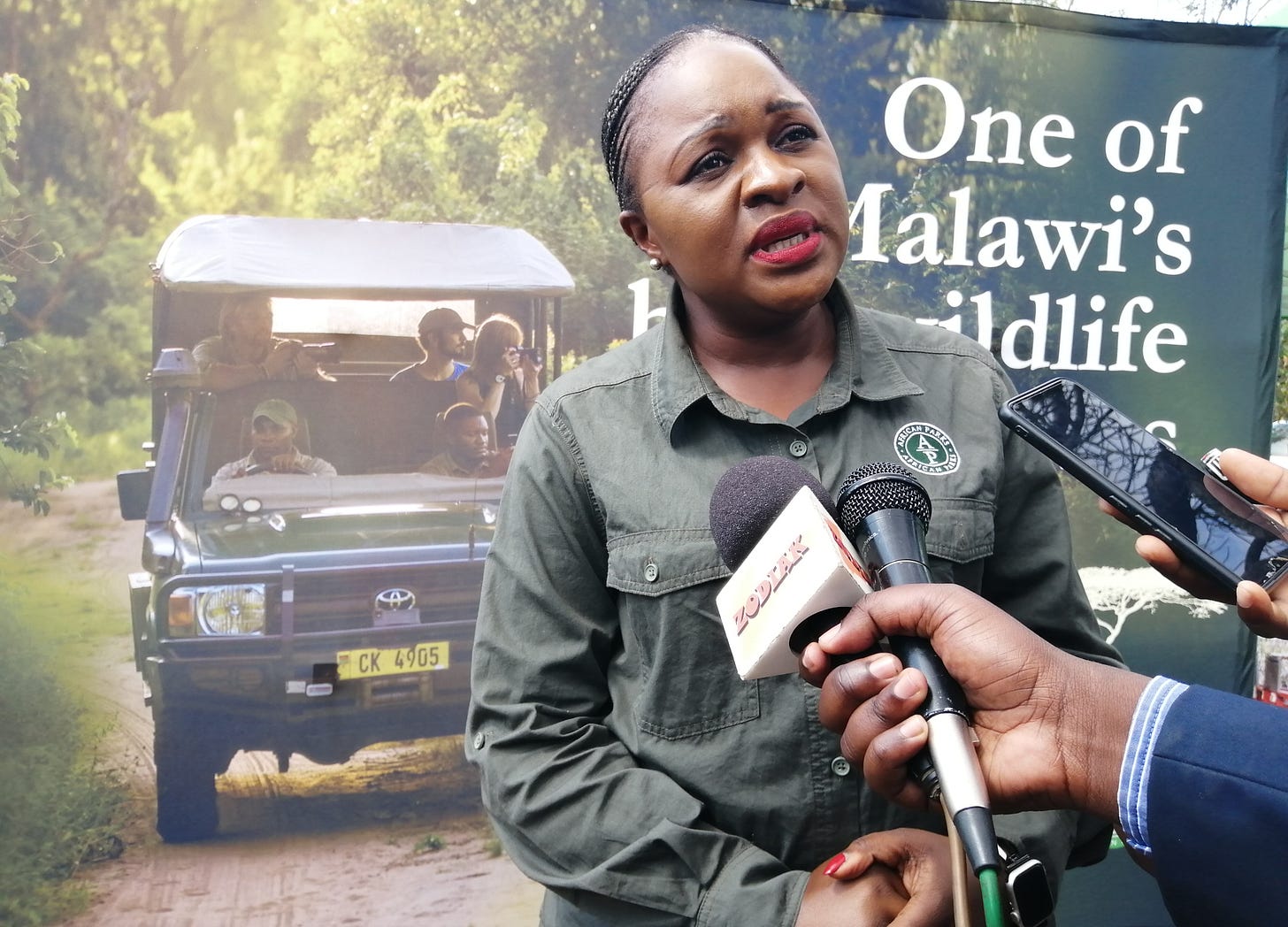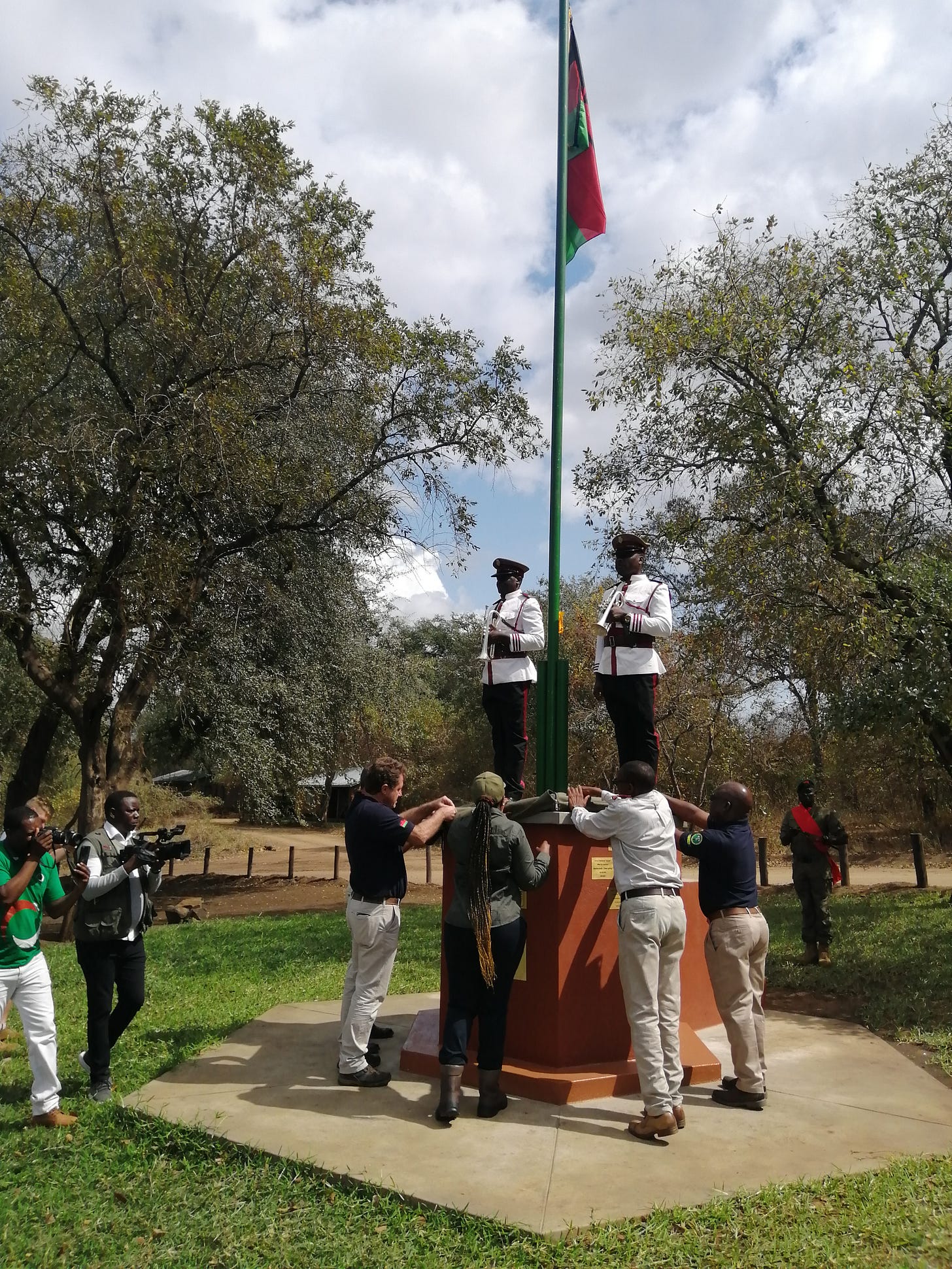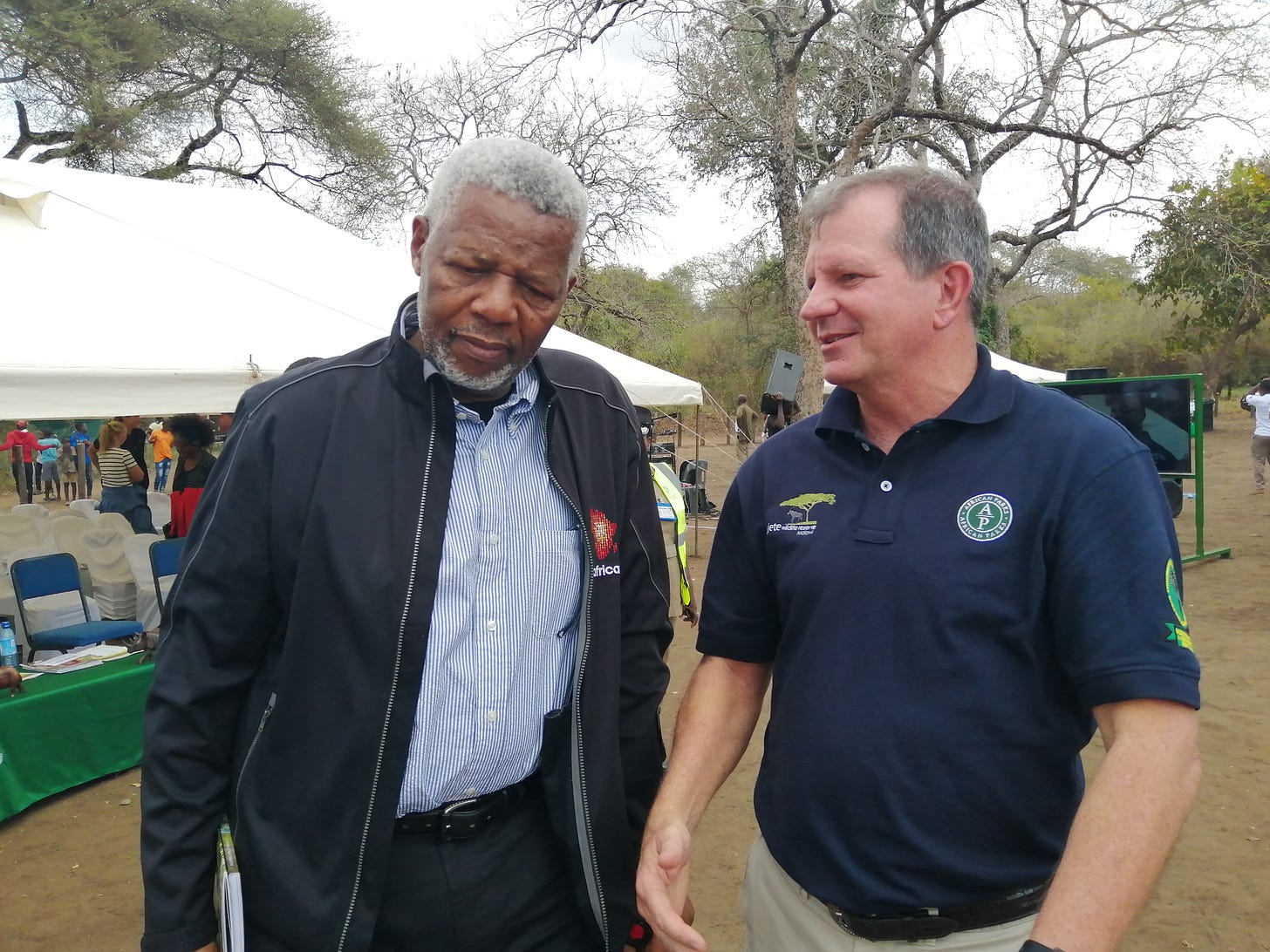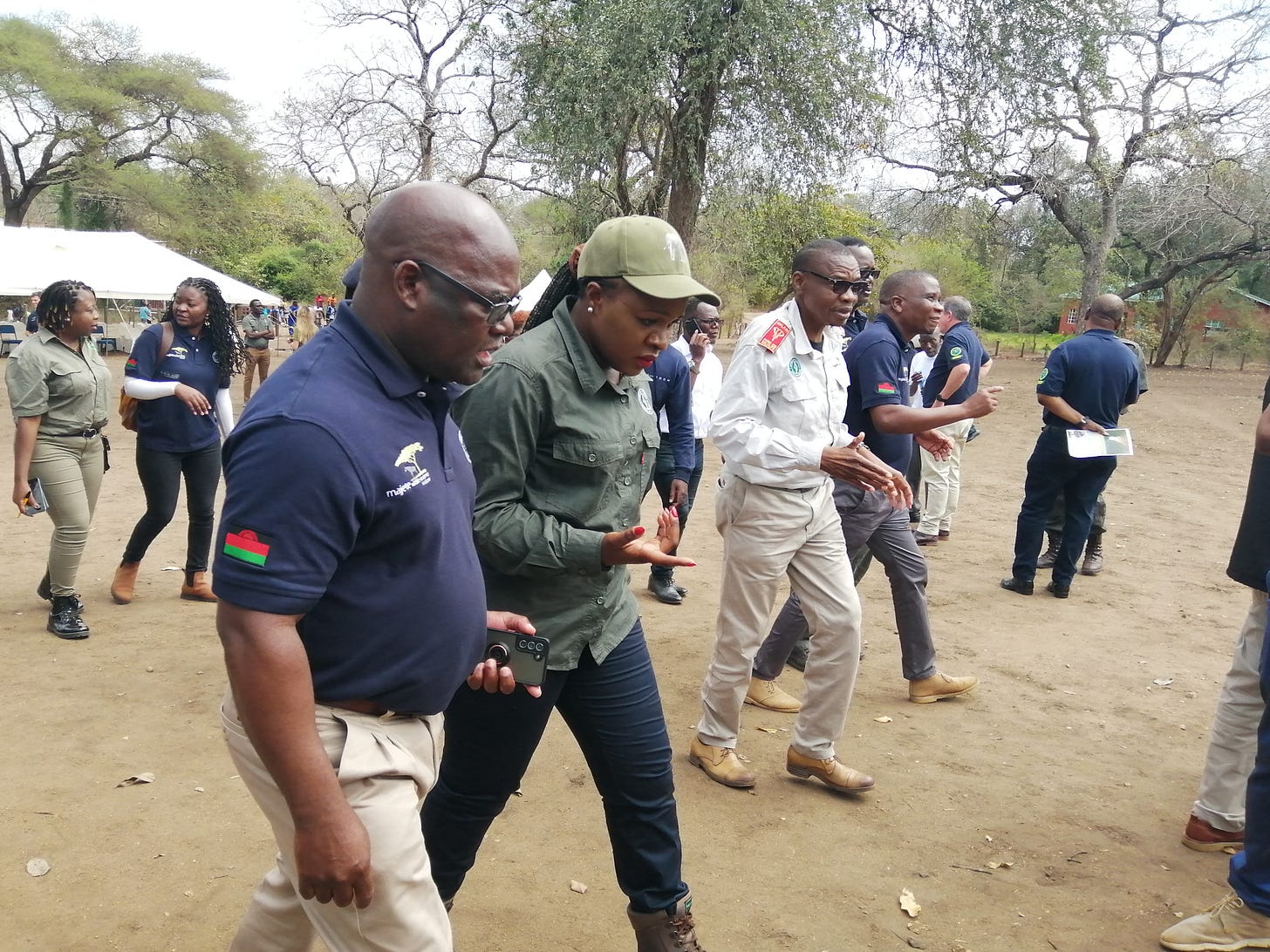MAJETE STORY - From sorry state to premier reserve two decades later
Majete Wildlife Reserve has rose from doom in 2003 to become Malawi's premier wildlife reserve two decades later and a sought – after tourist destination offering exhilarating safari opportunities

CHIKWAWA, Malawi (Planet Defence) – Mathithi African Parks Majete Wildlife Reserve's main administration wore a completely new face Tuesday (29th August, 2023) as pomp and jubilation marked 20 years of remarkable success.
The event witnessed by the Paramount Chief Lundu and traditional chiefs plus their subjects, staff old and present, learners, relevant sector stakeholders’ including media practitioners stands out as a pacesetter and best wildlife restoration efforts in Africa.
The event presided over by Minister of Tourism, Parks and Wildlife, Vera Kamtukule and themed, celebrating 20 years of collaboration was spiced with dog handling displays under the canine unit and a nearby wildlife club performances symbolising what partnerships can do to help resuscitate ecosystems on the brink of extinction.
The epitome of the celebration was the unveiling ceremony of a memorial pillar that now list down names of fallen members of staff. One of them being Lennox Makobosi, a ranger gunned down in the line of duty on 24th October, 1995 by armed poachers in the middle of the reserve. The national flag was hoisted above the pillar and it now fly high in recognition of the contributions of those long gone to the celebrated conservation success.
Kamtukule began by extending gratitude to African Parks for their unwavering commitment to the protection and preservation of precious wildlife reserves, a journey that started in Majete 2003.
“This partnership has exemplified the power of cooperation and the positive impact it can have on our protected areas and communities. African Parks has set the standard for rehabilitation and management against which all other parks in Malawi can be measured,” explained Kamtukule when she took to the podium.

She added that as Malawians reflect on the remarkable journey of Majete Wildlife Reserve, it was not possible to overlook the milestones that have transformed one of Malawi’s premier wildlife destinations.
“The introduction of key species such as elephants, lions, rhinos, and wild dogs, in some truly ground – breaking translocation events, has not only restored the reserve's ecological value but has also turned it into a sought – after tourist destination, offering safari opportunities that can compete on a global scale and raising the profile of Malawi tourism worldwide,” Kamtukule said adding that, “the influx of visitors that has come with Majete’s revival, from zero in 2003 to now over 12,000 in 2022, has not only helped the local economy but is contributing to the very foundation that our nation’s economy is built on.”
The Minister then reminded Malawians that Government development agenda is now prioritising agriculture, mining and tourism as economic growth sectors.
In this country, wildlife is the main ingredient of tourism Kamtukule said, therefore, promoting biodiversity conservation as African Parks has demonstrated in this reserve simply means aligning very well with Government development agenda.
The Minister then took a swipe at poachers that take lives of rangers at the frontline of conservation. “We don’t want to hear another case that a ranger has been killed by poachers,” she sounded the warning.
African Parks Chief Executive Officer, Peter Fearnhead had his favourite saying at the onset, “the best time to plant a tree is 20 years ago, and the next best time is today,” commenced his speech while greeting the audience muli bwanji anzathu the vernacular Chichewa language.
The saying emphasises lost opportunity, and the importance of taking immediate action.
“It is seldom that we can look back and celebrate results of a decision that was actually taken 20 years previously. So, it is indeed appropriate that we are all here at Majete, celebrating the reserve’s literal rising from the ashes to become the premier park in Malawi. To pay tribute to, and thank each and every individual that planted the tree and nurtured its growth over the last 20 years,” these were Fearnhead inaugural words.
He added that there have been many phases to get where we are now. Firstly, there were the initiators, those at the beginning with the vision, and a conviction that a different and more successful approach to conservation was possible.
“It is especially gratifying to have fellow founders of African Parks here today – Mavuso Msimang and Michael Eustace – and equally we remember with fondness and appreciation, the roles and contributions of the late Paul van Vlissingen and the late Dr. Anthony Hall – Martin and Catherina is so special to have you and Avril with us. As founders, I do not think that we had any idea that the 70,000 ha in Majete would be the start of a journey, that now involves 20 m ha across twelve different countries in Africa,” an optimist Fearnhead shared the background.
According to Fearnhead in as much as we may have had the idea and the will to plant that first tree, we needed a partner. We approached multiple Governments – including Malawi, but what we were suggesting was tantamount to conservation treason at the time – how can any organisation other than Government manage a protected area?

“It took Leonard Sefu, then Director of Department National Parks and Wildlife to break with accepted conservation dogma, against the advice of other conservation organisations and various consultants contracted to the Department at the time,” Fearnhead shared the historical facts.
He acknowledged and thanked the presence of Honourable Minister Vera Kamtukule who showed commitment to the partnership as a guest of honour.
“We have enjoyed an excellent relationship with Government of Malawi over the years, which is necessary to solve inevitable challenges that arise along the way, deepening trust, and which has led to our subsequent commitments to Liwonde, Nkhotakota and Mangochi,” said Fearnhead who acknowledged and thanked all project partners, the board, media, former staff like Patricio Ndadzela that have done the back-breaking work, over so many years.
This is not our heritage we are managing – it is yours – we thank you for the leadership you have shown and your proactive role in making sure these natural resources are preserved forever, advised Fearnhead while thanking primary stakeholders of Majete – the neighbouring communities, and in particular their traditional leaders.
The African Parks Chief Executive Officer wrapped his speech with the same words of protecting the tree he commenced with. Again, Fearnhead said as all of you know – the job of protecting a landscape is never done. Success can be obtained, but so too must it be maintained.
“As with the tree that was planted and has grown over the last 20 years, its only two minutes to chop down. Ensuring its survival, requires a shared vision by all who impact it, and a relentless commitment to execution of this vision; and the governance mechanisms that continually challenge, and course – adjust when needed. So my appeal to all of you is that we make sure that this remarkable tree that has grown over the last 20 years is passed on in a stronger and better position, to those that follow,” summed up Fearnhead in style.
Taking his turn African Parks Country Representative, Sam Kamoto thanked the Malawian government for the partnership in the management of Majete Wildlife Reserve in particular but also for the policy guidance provided all along this 20 – year conservation journey.
“Majete success story is a true testimony of how mother nature bounces back if given a chance and support to do so. We have witnessed this ecological phenomenon taking place before our eyes because we know that in 2003, Majete Wildlife Reserve was in a very sorry state. There was rampant poaching, charcoal burning, bushfires, and all the environmental ills you can think of. The fruit of this partnership is the rehabilitated reserve which we see today.,” Kamoto said in his speech.
The Country Representative appraised the audience that African Parks is managing four protected areas, namely: Majete, Liwonde, Nkhotakota, and Mangochi Forest Reserve. The rehabilitation work in all these protected areas is progressing very well and according to plan.
According to Kamoto, over $71.5 million has been invested in the management of these protected areas. A total of $ 6.7 Million gross has been the revenue generated from all the protected areas under African Parks management. Kamoto informed the gathering that African Parks on average spends $ 2.5 million to manage each park annually, adding conservation is certainly not a cheap undertaking. As part of job creation, African Parks has created 560 permanent jobs and employs many more as seasonal workers. This is in line with the government's agenda of wanting to create more jobs hence reducing of unemployment rate in the country
“I know you have visited Liwonde and Majete before but I humbly request that when you have time visit Nkhota - Kota Wildlife Reserve as well because it is another remarkable restoration effort the country and the continent have witnessed,” Kamoto made the appeal to Kamtukule.
He wrapped up by saying the remaining wildlife areas in Malawi need to be valued and jealously protected not only as products for the tourism industry but for posterity – for the future generation of Malawians to also enjoy the beauty of nature.
“Wildlife is our natural heritage and has no price dimension and all of us as Malawians need to play a role in protecting this heritage,” Kamoto said.
“We owe this to Anthony Hall Martin,” board chairperson of African Parks, Bob Renshaw explained who added since taking over the ravaged reserve then, there is no elephant or rhino that has been poached inside Majete Reserve Wildlife to date.
Chief Kanduku of Mwanza Chair of the Joint Liaison Committee whose area shares the reserve lauded the Majete story as a shining example that is giving hope to the community through employment, scholarship program for secondary and university students, Income-generating activities, safe water and school blocks.
All this is possible through collaboration with the community and Majete Wildlife Reserve management team.
African Parks is a non-profit conservation organisation that takes on direct responsibility for the rehabilitation and long-term management of protected areas in partnership with governments and local communities.




